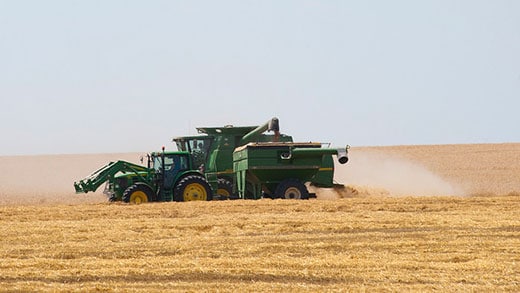The U.S. Department of Agriculture (USDA) announced that it would deregulate the HB4 drought-tolerant trait from Bioceres Crop Solutions. The National Association of Wheat Growers (NAWG) is thankful for the USDA’s decision to provide a robust, science-based process that affords a pathway for the cultivation of the HB4 trait in the United States, which has the potential to benefit both farmers and consumers. Access to drought-tolerant wheat like HB4 could help with global supply challenges and further enhance the sustainability of wheat by using less water and other inputs.
“As a wheat grower who has experienced drought firsthand, it is exciting to see a regulatory pathway where drought-tolerant wheat might be available to producers in the future,” said Oklahoma wheat farmer and NAWG President Keeff Felty. “Over the past few years, wheat producers across the major wheat producing regions have had to grapple with intense drought, and continued innovations like HB4 can be a tool that helps growers protect and stabilize their yields.”
NAWG and U.S. Wheat Associates (USW) have developed and maintain their joint “Wheat Industry Principles for Biotechnology Commercialization,” which outlines how transgenic wheat traits should be commercialized to best meet the U.S. wheat industries’ needs. While USDA’s deregulation of the trait provides a pathway for the cultivation of HB4, additional steps are needed before the trait’s benefits can be realized and commercialized in the United States. NAWG will continue to engage with Bioceres on its plans for commercialization in the United States and as they seek regulatory approval for our major export markets.
“As a past Chairman of the NAWG/U.S. Wheat Joint Wheat Breeding Innovation Committee, I traveled to Argentina with other U.S. wheat industry leaders in the fall of 2023 to see HB4 in the field and have a productive dialogue with Bioceres,” said Kansas wheat farmer and NAWG Board Member Kyler Millershaski. “The HB4 trait has tremendous potential – particularly for growers in Kansas who, in 2023 had the smallest crop since 1966 because of drought. We are fortunate to have a robust regulatory process in place by which these – and future – new traits can be brought to market for the benefit of both wheat growers and consumers.”
“Wherever wheat is grown in the world, drought takes its toll on yields and quality, so an innovation like HB4 holds a lot of interest for growers like me,” said USW Past Chairman and Okarche, Okla., wheat grower Michael Peters. “With global demand for wheat hitting new records almost every year, there is concern about variable production. A drought-tolerant trait offers more stable, sustainable production. At the same time, it is important that customers who have specific purchase preferences understand the industry supports their ability to purchase the type of wheat they want. That remains our policy after more than 16 years.”
“Our organization has established a productive dialogue with Bioceres, and we appreciate that the company understands the importance of our joint wheat industry principles,” said USW Director of Trade Policy Peter Laudeman. “I have travelled with growers to Argentina to see HB4 wheat in the field and they were impressed by its performance. We believe the trait represents good science with positive potential to improve food security in a more sustainable way.”
Laudeman noted that beyond the announcement of the competed regulatory review, it will still take years for Bioceres to complete the additional steps needed to successfully commercialize wheat with the HB4® trait in the United States.
“There is still a lot of ground to cover with this technology and our organization will stay actively engaged in the process on behalf of our farmers and overseas customers,” Laudeman said, “We appreciate the commitment that Bioceres is making to working with its wheat industry partners to ensure robust stewardship of this technology prior to commercial release.”
In addition to the U.S. Food and Drug Administration acknowledging they have no further questions regarding the safety of the HB4 trait in 2022, Bioceres has received regulatory approval for food and feed use in Nigeria, Brazil, Colombia, Indonesia, and South Africa, and has applied for approval in several other countries. Farmers are currently growing wheat with the HB4 trait in Argentina and Brazil. Bioceres also plans field trials in Australia with the intent to gain regulatory approval for cultivation there.
###
USW/NAWG


